Whether you’re interested in piano lessons for yourself or your child, determining what’s the best age to start piano lessons can be confusing.
If you want to start piano lessons as an adult, there’s no better time to start than now! For children, though, the answer is a bit more complicated. Luckily, we’re here to clear up any questions you might have!
Below, we’ll give you some insight into what the best time might be to start your child on piano lessons. Plus, discover why learning piano can significantly benefit any child’s development.
The Quick Answer: Best Age for Piano Lessons
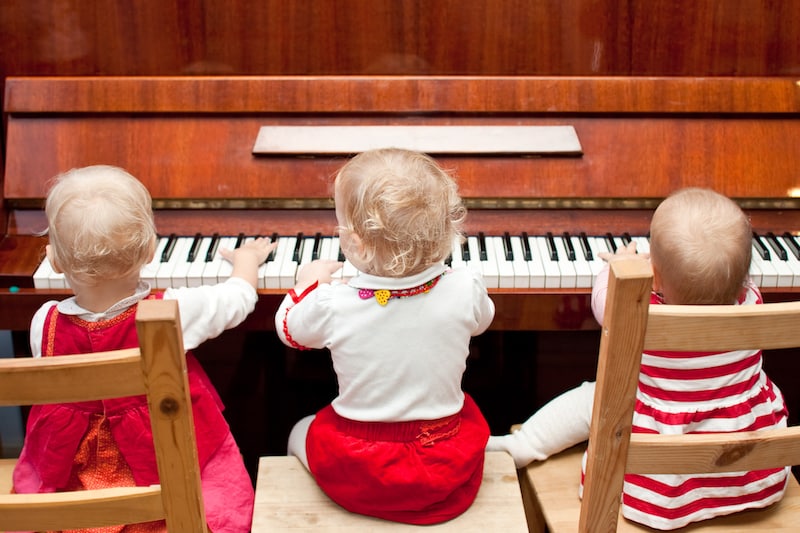
Most experienced piano teachers recommend starting piano lessons from the ages of six to nine.
Children are often most receptive to instructed material during this age window, especially regarding more complex subjects like music.
However, there are still some things to think about before getting your child started on the piano.
While early exposure to the instrument in an age-appropriate context can be important, paid lessons require some basic skills that every child develops at different times.
Keep reading to find out what signs you should look if you’re wondering if your child is ready for piano lessons.
How to Know If Your Child Is Ready for Piano Lessons
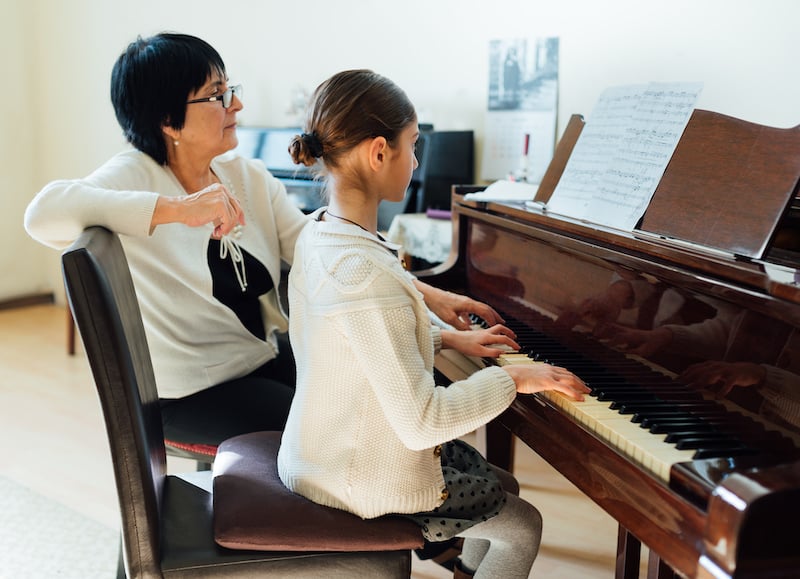
If you have a piano in your home, you may have noticed your child showing some interest in the instrument.
However, that doesn’t mean they’re automatically ready or interested in lessons.
Here are some of the key developmental points to look for to determine whether your child is ready for piano lessons.
Can They Count to Four?
In our opinion, the ability to count to four is one of the most important prerequisites for playing the piano.
While your child might develop some of the following skills before, counting to four is extremely helpful for fostering your child’s rhythm and timing.
Basic counting is essential for playing most of the beginner piano songs that will form the foundation of your child’s playing skills.
Do They Have Basic Motor Skills?
If your child has difficulty coordinating their limbs effectively, they might struggle with the piano.
Piano keys require a bit of finger strength and more than a bit of coordination, and consistently placing fingers in the wrong position can be a sign that your child isn’t ready for lessons.
However, playing the piano can actually help develop hand-eye coordination and foster improved limb control.
So, if your child is still a little awkward with their fingers and hands, practicing basic piano concepts might better prepare them for formal lessons.
Do They Know The Difference Between Left and Right?
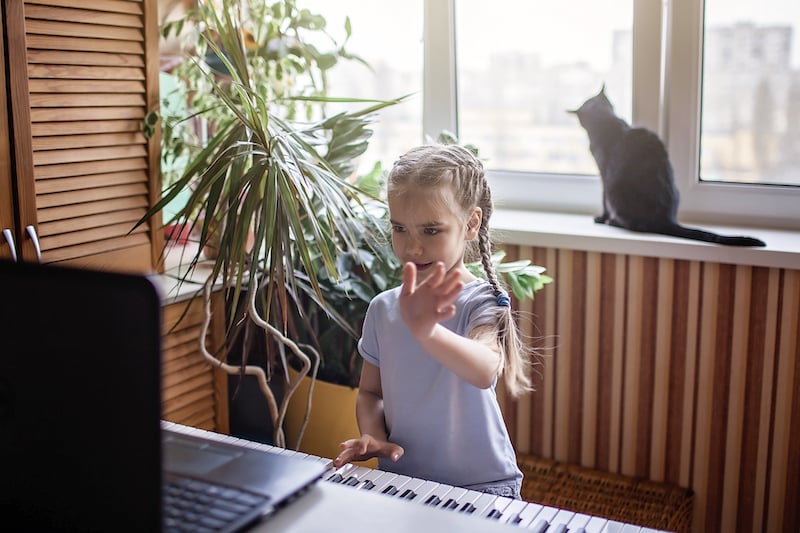
Knowing how to tell left from right is another crucial skill kids need before starting piano lessons.
Notes range from low to high as you move down the keys, meaning your child has to be able to tell which direction their hands should go if they want to play the correct note.
However, kids don’t need a highly-developed or acute sense of direction to play the piano.
Beginner lessons really only require knowledge of left vs. right, and practicing can foster more advanced directional skills over time.
Can They Focus for 30-Minutes or More?
While many children have developed the aforementioned motor and comprehension skills, they still can’t sit still for extended periods.
Most piano lessons range from 30-minutes to an hour, meaning your child will need to be able to sit at the piano with the teacher for at least 30-minutes.
If they can focus on this one task exclusively without being too distracted, they should be ready for piano lessons.
However, some children, especially those on the autism spectrum, actually learn better when they’re allowed to roam a bit more freely.
Determine what the best learning method is for your child with your teacher before forcing them to sit for lessons.
Can They Follow Instructions?
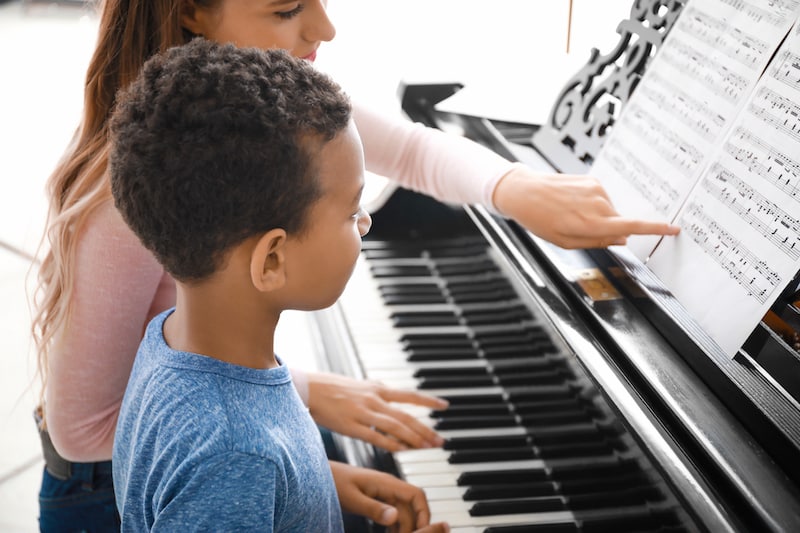
Some kids have a hot streak in them, meaning they’re not exactly the type to take directions well.
If your child bucks all sorts of authority and can’t follow instructions adequately, they might not be ready for piano lessons.
Students have to be able to take in what the teacher is telling them and implement it in their own playing.
This is a fairly advanced skill for children, meaning very young kids are less likely to be ready for lessons.
However, some children just need a bit more attention.
If they’re rebelling against a tutor’s instructions, they might require an alternative teaching approach to breakthrough.
Everyone learns differently, and your child might not learn piano the same way the teacher wants.
Do They Have Time to Practice Daily?
Unless you’re signing your child up for daily lessons, they’ll need time to practice playing piano on their own.
Young piano students need at least 30-minutes of daily practice time in order for their playing skills to improve.
While they might not have access to a piano every day, you may want to invest in a keyboard if you don’t have the full instrument at home.
If your child can sit to practice piano every day for 30-minutes, they’re probably ready for paid lessons.
What Are the Benefits of Piano Lessons for Children
Several studies have shown the benefits of piano lessons for children, but you probably don’t need science to know that playing an instrument is good for your child’s development.
Here are some of the specific ways in which playing the piano can improve your child’s life:
Cognitive
Over the years, studies have backed up the idea that studying piano can improve other aspects of your child’s cognitive development.
Practicing different keystrokes sharpens the senses and reinforces short and long-term memory.
Plus, the motor skills required for playing most beginner piano songs can improve your child’s ability to multitask in other areas of their life.
When some children might feel overwhelmed after being given a few tasks, pianists are often better equipped to deal with that emotional stress.
Also, the benefits of complex timing and rhythm can’t be understated.
Young piano players often score better in math and hard sciences than children who don’t play an instrument.
Social
Piano lessons can also be a great way to improve your child’s social skills.
Taking direction, active listening, and skill repetition are all part and parcel of taking lessons for piano.
As a result, young pianists are often ahead of the curve when they enter a classroom or other instructive setting.
Creativity
Lastly, learning the piano is a fantastic way for your child to unleash their inner creativity.
Everyone knows that healthy creative expression is a crucial part of every child’s development, and piano can be one of the best avenues for your child to be creative.
Crafting songs, comparing different styles, and learning emotive expressions while playing are all skills your child can develop during piano lessons.
Plus, children who took piano lessons are often better at divergent thinking and problem-solving than their peers.
Creative expression through the piano can lead to creative solutions in their adult and professional lives, even if they don’t become the next big concert pianist.
Can Some Kids Start Piano Earlier Than Six?
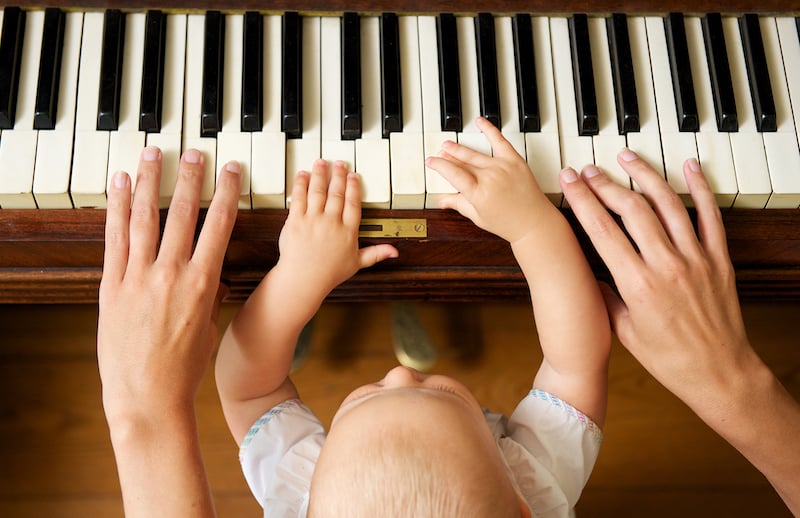
As we’ve said, every child is different. While we tend to think six years old is the optimal starting point for most kids, your child might be able to begin piano lessons sooner.
Some children develop an extended attention span younger than others, which is key to sitting still for piano lessons.
Also, they may be quick with their fingers, capable of moving faster on the keys than other kids despite their small hands.
Evaluate whether your child has the motor skills and attention span necessary for half-hour lessons. Then, ask if they want piano lessons.
It’s much more difficult to teach very young children something they don’t want to learn versus something they’re interested in.
Also, having a piano in your home is an excellent alternative to starting formal lessons with a child before six.
If someone knows how to play, showing kids basic concepts and letting them mess around on the keys is a great way to prepare them for paid lessons when they’re ready.
Conclusion
As you can see, piano lessons can be a huge benefit to your child’s development if introduced at the right age.
While some children are ready for lessons before six, the best time for most children is between the ages of six and nine.
During this crucial development period, piano lessons could be just the thing to ignite your child’s lifelong passion for music!
Once your child is ready, figuring out your budget for lessons should be your next step.
Check out our article covering how much you should be paying for piano lessons here.
Also, remember that you’re never too old to start piano lessons!
Even if you’re not a kid, piano lessons can be a fun and stimulating way to keep the learning spirit as you get older!

